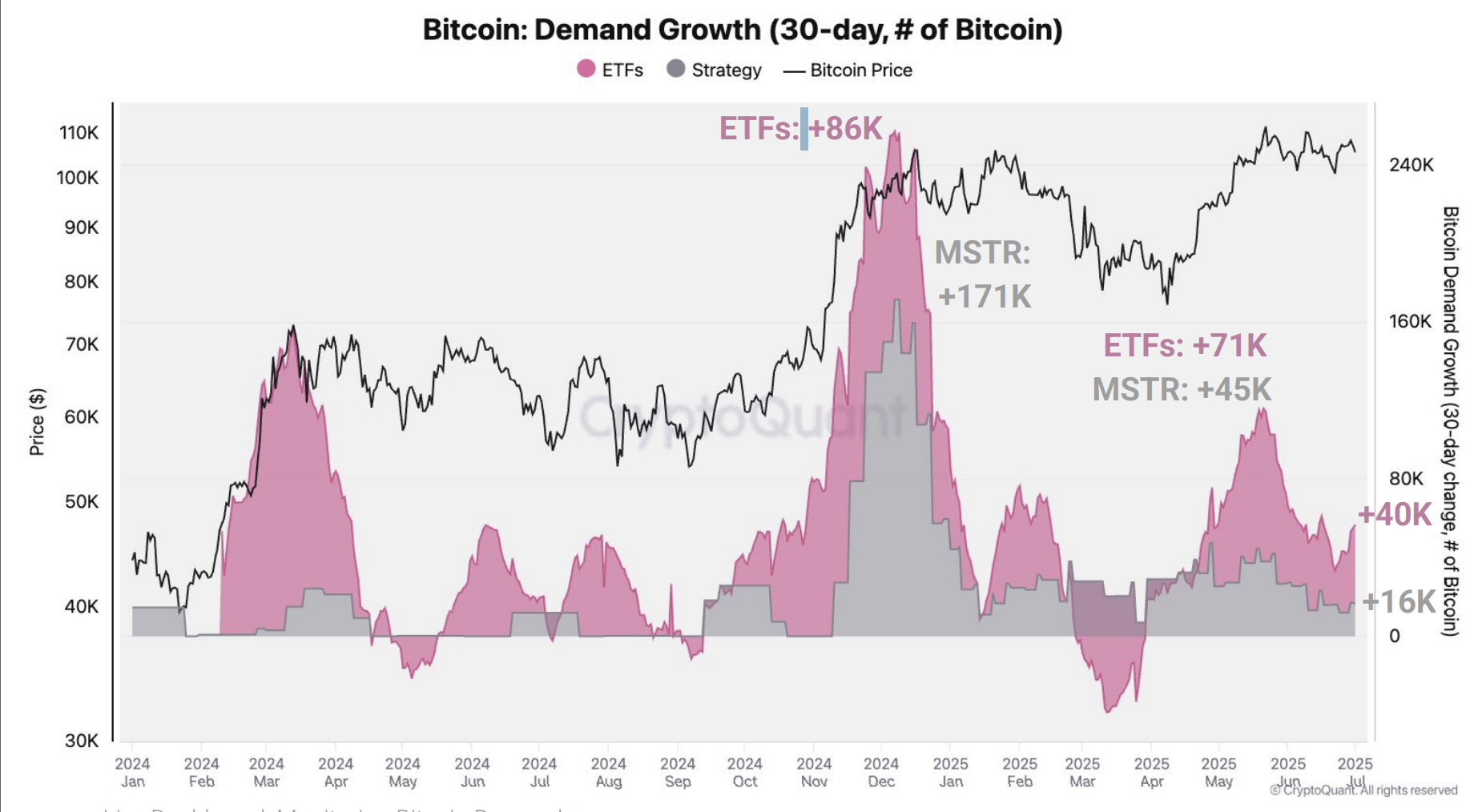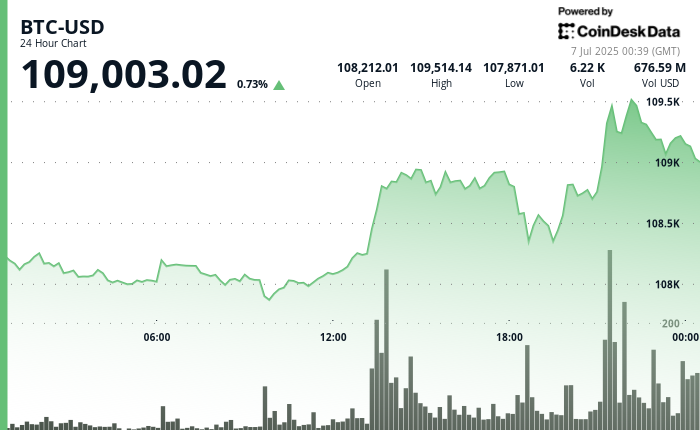Uncategorized
Asia Morning Briefing: Michael Saylor’s BTC Buys Aren’t Making Up For Slowing Spot Demand Say Analysts

Good Morning, Asia. Here’s what’s making news in the markets:
Welcome to Asia Morning Briefing, a daily summary of top stories during U.S. hours and an overview of market moves and analysis. For a detailed overview of U.S. markets, see CoinDesk’s Crypto Daybook Americas.
As Asia begins a new trading week, bitcoin (BTC) is changing hands at $109K, up 0.8% in the last week or 4.5% in the last month according to CoinDesk market data.
In an era of continued sizeable BTC buys from Michael Saylor’s Strategy (MSTR), sustained BTC Exchange Traded Fund (ETF) inflows, and more companies adopting a BTC treasury strategy, one has to wonder why bitcoin’s price hasn’t shot past all time highs.
A new report from CryptoQuant spells it out: all of this institutional action isn’t making up for a general decline in spot demand for BTC.
«The annual growth of Bitcoin demand shows a similar picture: ETFs and MSTR purchases are a portion of Bitcoin demand, overall demand contraction is more than offsetting these purchases, and the acceleration of overall demand growth is what drives price rallies,» CryptoQuant wrote in a recent report.
CryptoQuant points out that over the last 30 days, there’s been a contraction in demand for BTC to the tune of -895K.

In addition, compared to December, ETF and MSTR buys are slowing. In the last month of the year, ETFs bought 86,000 BTC and MSTR 171,000, while in the last month those numbers are down significantly. ETFs only purchased 40K BTC while MSTR bought 16K.
BTC is stuck in a consolidation phase and demand isn’t there to fuel a breakout, CryptoQuant writes.
One additional datapoint for proof of slowing demand is BTC’s nearly empty mempool, which demonstrates how little retail spot demand the market has.
The question is, if institutional buys continue to slow, how much resistance will it put on BTC’s price?
SkyBridge Capital’s Anthony Scaramucci is on the record as saying that the BTC treasury trend — a reliable source of demand for bitcoin — will fade.
“Right now we’re having this replicative treasury company idea,” Scaramucci said during an interview with Bloomberg last week. “So, you know, it will fade.”
“Saylor’s case is different, because he’s got a couple different products going now,” Scaramucci continued in the interview. “I’m not negative on the others, because I’m too bullish on bitcoin, but I would just say as an investor, you have to look through the underlying costs associated with each one of these treasury companies.”
Meanwhile, Standard Chartered remains a BTC bull with the bank maintaining its $200K price target for the world’s largest digital asset.

Market Movements:
- BTC: Bitcoin consolidated above $108,500 over the weekend then surged from $108,327 to $108,620 in the last hour, with $108,200-$108,300 now supporting the uptrend.
- ETH: Ethereum rallied from $2,520.45 to $2,558.63 on July 6 with trading volume spiking to 272,352 ETH, finding support at $2,510 amid global economic tensions, while $1.1 billion in June ETH ETF inflows and record whale accumulation signal potential for a breakout despite resistance near $2,600.
- Gold: Gold surged 1.91% to $3,336.61 last week, driven by a weakening dollar, 91.5% odds of a Federal Reserve rate cut in September, looming tariff threats, and a 73% spike in China’s gold imports
- Nikkei 225: Japan’s benchmark Nikkei 225 slipped 0.26% after the White House continued with its mixed messages on tariffs.
Elsewhere in Crypto:
Business
Crypto Trading Firm Keyrock Buys Luxembourg’s Turing Capital in Asset Management Push

Crypto trading firm Keyrock said it’s expanding into asset and wealth management by acquiring Turing Capital, a Luxembourg-registered alternative investment fund manager.
The deal, announced on Tuesday, marks the launch of Keyrock’s Asset and Wealth Management division, a new business unit dedicated to institutional clients and private investors.
Keyrock, founded in Brussels, Belgium and best known for its work in market making, options and OTC trading, said it will fold Turing Capital’s investment strategies and Luxembourg fund management structure into its wider platform. The division will be led by Turing Capital co-founder Jorge Schnura, who joins Keyrock’s executive committee as president of the unit.
The company said the expansion will allow it to provide services across the full lifecycle of digital assets, from liquidity provision to long-term investment strategies. «In the near future, all assets will live onchain,» Schnura said, noting that the merger positions the group to capture opportunities as traditional financial products migrate to blockchain rails.
Keyrock has also applied for regulatory approval under the EU’s crypto framework MiCA through a filing with Liechtenstein’s financial regulator. If approved, the firm plans to offer portfolio management and advisory services, aiming to compete directly with traditional asset managers as well as crypto-native players.
«Today’s launch sets the stage for our longer-term ambition: bringing asset management on-chain in a way that truly meets institutional standards,» Keyrock CSO Juan David Mendieta said in a statement.
Read more: Stablecoin Payments Projected to Top $1T Annually by 2030, Market Maker Keyrock Says
Business
Crypto Trading Firm Keyrock Buys Luxembourg’s Turing Capital in Asset Management Push

Crypto trading firm Keyrock said it’s expanding into asset and wealth management by acquiring Turing Capital, a Luxembourg-registered alternative investment fund manager.
The deal, announced on Tuesday, marks the launch of Keyrock’s Asset and Wealth Management division, a new business unit dedicated to institutional clients and private investors.
Keyrock, founded in Brussels, Belgium and best known for its work in market making, options and OTC trading, said it will fold Turing Capital’s investment strategies and Luxembourg fund management structure into its wider platform. The division will be led by Turing Capital co-founder Jorge Schnura, who joins Keyrock’s executive committee as president of the unit.
The company said the expansion will allow it to provide services across the full lifecycle of digital assets, from liquidity provision to long-term investment strategies. «In the near future, all assets will live onchain,» Schnura said, noting that the merger positions the group to capture opportunities as traditional financial products migrate to blockchain rails.
Keyrock has also applied for regulatory approval under the EU’s crypto framework MiCA through a filing with Liechtenstein’s financial regulator. If approved, the firm plans to offer portfolio management and advisory services, aiming to compete directly with traditional asset managers as well as crypto-native players.
«Today’s launch sets the stage for our longer-term ambition: bringing asset management on-chain in a way that truly meets institutional standards,» Keyrock CSO Juan David Mendieta said in a statement.
Read more: Stablecoin Payments Projected to Top $1T Annually by 2030, Market Maker Keyrock Says
Business
Gemini Shares Slide 6%, Extending Post-IPO Slump to 24%

Gemini Space Station (GEMI), the crypto exchange founded by Cameron and Tyler Winklevoss, has seen its shares tumble by more than 20% since listing on the Nasdaq last Friday.
The stock is down around 6% on Tuesday, trading at $30.42, and has dropped nearly 24% over the past week. The sharp decline follows an initial surge after the company raised $425 million in its IPO, pricing shares at $28 and valuing the firm at $3.3 billion before trading began.
On its first day, GEMI spiked to $45.89 before closing at $32 — a 14% premium to its offer price. But since hitting that high, shares have plunged more than 34%, erasing most of the early enthusiasm from public market investors.
The broader crypto equity market has remained more stable. Coinbase (COIN), the largest U.S. crypto exchange, is flat over the past week. Robinhood (HOOD), which derives part of its revenue from crypto, is down 3%. Token issuer Circle (CRCL), on the other hand, is up 13% over the same period.
Part of the pressure on Gemini’s stock may stem from its financials. The company posted a $283 million net loss in the first half of 2025, following a $159 million loss in all of 2024. Despite raising fresh capital, the numbers suggest the business is still far from turning a profit.
Compass Point analyst Ed Engel noted that GEMI is currently trading at 26 times its annualized first-half revenue. That multiple — often used to gauge whether a stock is expensive — means investors are paying 26 dollars for every dollar the company is expected to generate in sales this year. For a loss-making company in a volatile sector, that’s a steep price, and could be fueling investor skepticism.
-

 Business11 месяцев ago
Business11 месяцев ago3 Ways to make your business presentation more relatable
-

 Fashion11 месяцев ago
Fashion11 месяцев agoAccording to Dior Couture, this taboo fashion accessory is back
-

 Entertainment11 месяцев ago
Entertainment11 месяцев ago10 Artists who retired from music and made a comeback
-

 Entertainment11 месяцев ago
Entertainment11 месяцев ago\’Better Call Saul\’ has been renewed for a fourth season
-

 Entertainment11 месяцев ago
Entertainment11 месяцев agoNew Season 8 Walking Dead trailer flashes forward in time
-

 Business11 месяцев ago
Business11 месяцев ago15 Habits that could be hurting your business relationships
-

 Entertainment11 месяцев ago
Entertainment11 месяцев agoMeet Superman\’s grandfather in new trailer for Krypton
-

 Entertainment11 месяцев ago
Entertainment11 месяцев agoDisney\’s live-action Aladdin finally finds its stars




